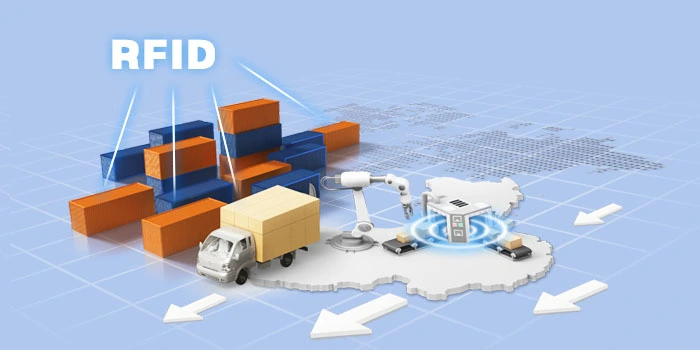As a company grows, its supply chain becomes larger and more complex. Each step in the supply chain must be accurate. That’s where RFID technology enters and helps.
RFID mainly monitors and manages inventory, assets, shipments, and supply chain vehicles. It helps improve visibility and distribution.
Without good visibility and accuracy, the production of any company can suffer. RFID has been a solution for a while, and some may think it is outdated. However, it is still helpful in the supply chain industry and has existed for a long time.
What does RFID mean in supply chains?
RFID technology has existed since the 1980s. It was used in things like making cars and paying tolls.
The use of RFID in supply chain management is recent and began in the early 2000s. In supply chains, RFID uses special readers and tags. These tags can be active, passive, or battery-assisted passive. Using RFID tags brings things faster and softer compared to barcodes.
RFID technology is great for counting and monitoring elements with accuracy. It also helps provide better chains to make things easier to see and reduce how much it costs to run them.
Comparison between RFID and bar code for tracking inventory
In logistics, there are two important tools for finding and identifying products: barcodes and RFID tags. People might take them similarly, but they work in different ways.
Both barcodes and RFID tags help monitor objects and manage inventory. But one is like a sticker that has to be scanned, and the other is like a mobile signal.
Barcodes scan a code (such as UPC) to discover what a product is and where it is stored. However, because barcodes depend on stationary systems, they cannot monitor the elements in real time.
On the other hand, RFID labels can be followed as they progress along the supply chain to see where they are in real-time.
Advantages of RFID in Supply Chain Management and Logistics:
- Improved tracking and visibility:
RFID gives accurate, precise, and clear information about each item in a company’s supply chain. It starts right from when something is stored until it is delivered.
RFID technology eliminates the need for boring manual work and difficult tasks that require a lot of time. It allows companies to make decisions about their inventory immediately and helps them have a fair amount of things to work well. RFID also means better customer service. With RFID, companies can tell customers exactly where their orders are, make them faster to deliver them, and make sure the customers get what they want. RFID-based tracking changes the industry to work better and succeed in the long term.
- Less work, lower cost:
RFID tags are really good for many reasons. They help you keep track of your things, save money by not needing people to write data, count things automatically present on shelves, and make things the safest. These things make RFID tags important for any business that moves and manages things.
- Better protection:
Using RFID tags for additional security becomes a necessary improvement in how logistics and stores work. When companies put RFID chips on their items, they can monitor them constantly. It ensures that nothing is lost or stolen while things move. This gives companies more confidence that their objects will reach their destination safely and as planned.
While more and more are starting to use these special tags, they may feel more relaxed knowing that their products are in good hands wherever they go.
- Increase productivity:
When you work with barcodes, you have to see them to scan. This means you will waste a lot of time walking towards each item, finding a barcode, and scanning it with a device.
But RFID has made it more accessible. It uses radio waves to find out where the item is. These tags make it faster to find and follow the items.
In addition, spending less time finding things saves money on labor costs and improves the whole operation.
- Fixing inventory errors:
RFID technology is like a detective that tracks problems to get, store, or move products. People working in stores can use RFID to know where a single item has gone and discover why there is an error.
For example, if someone puts something in the wrong place, an RFID scanner might say: “Hey, this item should be somewhere else!” RFID tells how the mistake happened and can also help managers discover how to prevent it from happening again.
- Automate how things get in, stored and sent:
Today’s warehouses want to use machines to make things move faster. RFID helps these machines, such as robots, to find out what to do with the products.
Product tags tell the robots where things will be placed or where to find them, and packaging tags help machines select the appropriate boxes for each article. Equipment tags help robots to move products using special tools.
Using machines like these can mean that many people do not need to do the job, saving the company money.
- Better service for customers
RFID technology helps companies do things more accurately and quickly, making customers happier and more satisfied.
For example, if a customer wants something out of stock, RFID tags will help find it quickly and take it to the client’s door. In addition, companies can use RFID tags to monitor customer orders and make sure they are delivered on time.

